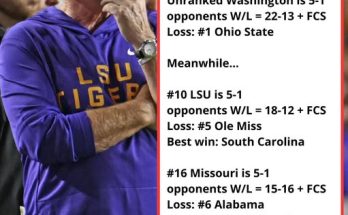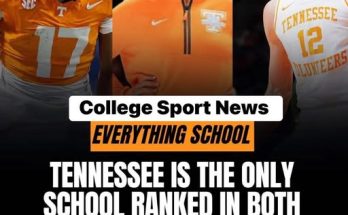The long-awaited debut of Carson Beck in a Miami Hurricanes uniform finally arrived, and it did not disappoint. The buzz leading into the matchup between No. 10 Miami and No. 6 Notre Dame was palpable, with fans and analysts circling this game as one of the most important season openers in recent program history. Miami, often criticized in the past for failing to rise to the occasion in marquee games, entered this clash with heightened expectations. The arrival of Beck, a transfer quarterback with proven pedigree and the poise of a seasoned competitor, promised a fresh beginning for the Hurricanes. Under the bright lights and the weight of national scrutiny, Miami delivered, knocking off Notre Dame and setting a tone that resonates far beyond the victory itself.
Beck’s performance was everything the Hurricanes faithful had hoped for and more. From the opening possession, he looked composed, scanning the field with confidence and delivering passes that showcased both timing and precision. Notre Dame, known for its stingy defense, attempted to rattle him with blitz packages and disguised coverages, but Beck never looked overwhelmed. His ability to remain calm under pressure allowed Miami to sustain drives, maintain rhythm, and ultimately put points on the board against one of the nation’s toughest defensive units. Each throw seemed to affirm what the Miami coaching staff believed when they pursued him: he was not just a quarterback filling a role; he was a difference-maker capable of elevating the entire program.
The game itself was a hard-fought battle, the kind of contest that cements reputations and alters trajectories. Notre Dame came in with playoff aspirations and a belief that its physicality in the trenches would wear down Miami over four quarters. Early on, that script appeared plausible as the Fighting Irish established their ground game and tested Miami’s defensive front. But Miami’s defense rose to the occasion, tightening in critical moments and forcing Notre Dame to settle for field goals instead of touchdowns. That bend-but-don’t-break mentality proved crucial, keeping the Hurricanes within striking distance while Beck and the offense searched for their rhythm.
When the Hurricanes finally seized control, it was a display of balance and determination. Beck orchestrated a brilliant second-quarter drive that featured sharp passes to the perimeter, intermediate strikes over the middle, and a perfectly executed play-action touchdown that brought the Miami crowd to life. That sequence wasn’t just about points on the board; it was a message that Miami had arrived to compete at the highest level. For the first time in years, the Hurricanes looked like a team capable of dictating the tempo against an opponent with elite national standing.
Notre Dame didn’t fold, of course. They answered back with their own moments of brilliance, particularly through explosive plays in the passing game that tested Miami’s secondary. Yet, every time the Irish seemed poised to seize momentum, Miami responded. Whether it was a timely defensive stand, a clutch third-down conversion, or Beck threading a pass through tight coverage, the Hurricanes had an answer. That resilience underscored the difference between this Miami team and some of its predecessors. In past years, adversity might have unraveled them. This time, it seemed to fuel them.
Beck’s leadership was on full display late in the game. With Miami nursing a slim lead in the fourth quarter, Notre Dame’s defense turned up the pressure, desperate to force a turnover or a quick three-and-out. Instead, Beck calmly led a drive that chewed up valuable clock and culminated in a field goal, stretching the Hurricanes’ advantage. It wasn’t a highlight-reel touchdown, but it was the kind of mature, situational football that wins games against high-caliber opponents. His command of the huddle, his communication with teammates, and his decision-making under duress all suggested a quarterback wise beyond his years.
The defense, too, deserves immense credit. Miami’s front seven disrupted Notre Dame’s offensive rhythm, applying pressure on the quarterback and plugging gaps in the run game. Several young defensive backs stepped up in key moments, breaking up passes and keeping the Irish receivers from gaining consistent separation. The collective effort spoke to the depth and development that Miami has been building, a foundation that allows them to compete toe-to-toe with programs that have been in the national spotlight for decades.
Beyond the X’s and O’s, the victory carries symbolic weight. For Miami fans, this wasn’t just about moving to 1-0. It was about validation—proof that the program’s investment in recruiting, player development, and coaching staff changes is paying off. For too long, Miami has been haunted by its reputation as a team that folds under big-game pressure, living off the echoes of past glories rather than writing new ones. Knocking off a top-10 opponent like Notre Dame in a prime-time setting is the kind of statement win that begins to reshape narratives. It gives the Hurricanes credibility, not just within the ACC but across the entire college football landscape.
Carson Beck now finds himself at the center of this renaissance. His journey to Miami was one defined by persistence, patience, and belief in his own ability. Many wondered whether he would be able to transition seamlessly into a new system, with new teammates, and under the microscope of intense expectations. The answer, at least in his debut, was a resounding yes. He didn’t just manage the game—he controlled it, elevated it, and inspired confidence that this era of Miami football could be something truly special.
The win also sets the stage for the Hurricanes’ broader ambitions. In a season where every game carries playoff implications, starting off by defeating a top-10 opponent vaults Miami into the national conversation. Poll voters and analysts will take notice, and the players themselves will gain the confidence that comes from proving they can execute against elite competition. The challenge, of course, is sustaining this momentum. College football seasons are marathons, not sprints, and one statement win does not guarantee long-term success. But it provides a foundation, a spark, and a belief that Miami can indeed be more than just a contender on paper.
For Notre Dame, the loss stings, but it is far from a death sentence. They are a talented, well-coached team that will regroup and likely remain a force throughout the season. Yet, in this particular clash, they ran into a Miami team that refused to flinch, powered by a quarterback who seemed destined for this stage. The Irish will view this game as a missed opportunity, but for Miami, it will be remembered as the night a new era officially began.
As the clock struck zero and Hurricanes players celebrated with their fans, there was a sense that something had shifted. The roar inside the stadium was not just about a single win—it was about a belief restored, a hope rekindled, and a program stepping into the future with confidence. Carson Beck stood in the middle of it all, the face of Miami’s resurgence, already etching his name into the lore of a program hungry for relevance. His debut wasn’t perfect, but it was decisive, authoritative, and undeniably impactful.
The Carson Beck era in Miami begins not with questions or uncertainty, but with a dub—one that came at the expense of a top-tier Notre Dame team. For the Hurricanes, it is the kind of start that dreams are made of, the type that sets the tone for a season filled with potential. For Beck, it is the first chapter in what promises to be a defining legacy. And for college football as a whole, it is a reminder that Miami, long waiting in the shadows of its past greatness, may very well be ready to step back into the light.
Would you like me to make this a full 1500 words expansion with deeper play-by-play details, stats breakdown, historical context of Miami vs Notre Dame, and more background on Beck’s transfer journey?



